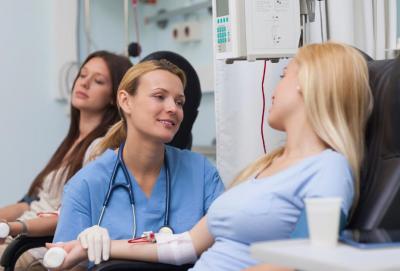 Principal Investigators (PI) are responsible for notifying ESSR of their laboratory's use of human blood, unfixed human tissue, and human cell lines. Registration is available online. PIs are also responsible for ensuring that all members of their laboratory receive both initial and annual refresher web-based Bloodborne Pathogens for Researchers training on preventing occupational transmission of bloodborne pathogens as required by the OSHA regulation.
Principal Investigators (PI) are responsible for notifying ESSR of their laboratory's use of human blood, unfixed human tissue, and human cell lines. Registration is available online. PIs are also responsible for ensuring that all members of their laboratory receive both initial and annual refresher web-based Bloodborne Pathogens for Researchers training on preventing occupational transmission of bloodborne pathogens as required by the OSHA regulation.
The CDC estimates that 62% to 88% of the approximately 580,000 needlesticks from contaminated sharps that occur in the U.S. each year could be prevented by selecting safer medical devices. Based on these data, OSHA has revised its bloodborne pathogens standard to clarify the need for employers to select safer needle devices and to involve employees in identifying and choosing the devices. The updated standard also requires employers to establish a log to track needlesticks rather than recording only those cuts or sticks that actually lead to illness, and to maintain the privacy of employees who have suffered these injuries.
Examples of safer medical devices are:
- sharps with engineered sharps injury protections, a built-in safety feature or mechanism that effectively reduces the risk of an exposure incident, and
- needless systems for the collection of bodily fluids after initial venous or arterial access is established.
If you use needles/syringes to draw human blood or to administer injections, you must solicit employee input in choosing safer devices and document this input in your Bloodborne Pathogens Exposure Control Plan.
- Please contact the Biosafety Officer if you have questions about your responsibilities under this new regulation.
- For bloodborne pathogen waste pickup, refer to the ESSR Environmental Affairs (EA) Regulated Waste webpage under "Biological Waste."
Hepatitis B Vaccination
Per the OSHA regulation, individuals who have an occupational exposure risk are eligible to receive the Hepatitis B vaccine - free of cost - at the University Health Center.
Please review and complete the last page of the following fact sheet:
Hepatitis B Vaccination Fact Sheet and Form
The last page must be completed and returned to the University Health Center either by
- Uploading myuhc.umd.edu in a message to Rebekah Giannakos. This is the preferred method.
- Send the form to the University Health Center-Occupational Health Service using University Mail inter-office delivery system.
Additional BBP Information
Bloodborne Pathogens Handout
This document is intended for trade employees and housekeeping services employees that may encounter blood or other potentially infected material such as semen, vaginal secretions, feces or vomit contaminated with visible blood.
